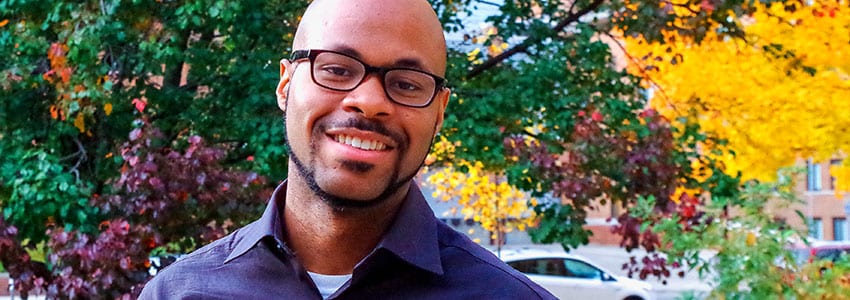Ryan already went to grad school. He earned his Master’s in Interpersonal Practice and Mental Health from the School of Social Work and became a clinical social worker. He loved it and found work helping individuals to be rewarding. But he needed more. He says, “It was evident to me that the things I was interested in required a more macro approach. More research in terms of the structural disparities was necessary for the populations I was interested in. Clinical work on a micro level was fulfilling but it has its shortcomings as well. Half way through my social work career, I decided to go back to school to do research.”
Coming back to U-M was a seamless transition for him, although there were the expected learning curves that most Ph.D. students face. “A doctoral program is not a walk in the park by any stretch of the imagination. I feel very well supported here – tremendously so, from day one. That social support and professional guidance has been invaluable to me and made my life a lot easier. Work is hard and the support is here.”
Ryan’s research interests are broadly focused on racial and ethnic health disparities among gay, bisexual, and other men who have sex with men. A scholar in the Center for Research on Ethnicity, Culture, and Health (CRECH), Ryan examines sexuality, sexual health, structural determinants of HIV/AIDS, and other related health issues faced by men of color in the LGBT community. “I felt a calling to go back to my roots and explore topics related to mental health, so I’m also focusing on the intersection of sexuality and psychosocial functioning.”
Currently, he’s finalizing his dissertation proposal, remarking, “This is an understudied phenomenon called racialized sexual discrimination (RSD) and is generally defined as sexualized discrimination on the basis of race/ethnicity, in places where gay and bisexual men are seeking sexual partners. RSD embodies a host of complex factors, including sexual scripts, cultural standards of beauty, objectification, overt/covert exclusion, and sociohistorical legacies of racial inequality. It also has implications for a number of health outcomes, including both sexual and mental health.
“My goal is to develop a survey that can accurately capture the construct of RSD. This is a concept that has never been pinned down, and I want to create an instrument to measure it. I’m preparing to run a focus group for people in my target demographic, which includes young gay and bisexual men and/or individuals who work with that population in a professional capacity, in order to talk about item construction for this instrument.
Once the focus group helps review and clarify the instrument, Ryan will include it in a larger, nationwide survey alongside additional behavioral and psychosocial measures. The second part of his dissertation will be to assess the validity of the newly developed instrument, so that it may be used to test a model exploring the pathways between RSD and a variety of psychosocial outcomes, such as depression, self-esteem and self-worth. He says, “This topic is so understudied, there is so much opportunity to explore this phenomenon. I’m looking forward to developing it, there is so much space for a research career here.”
Even before beginning his Ph.D. program, Ryan had the opportunity to launch a research study in Western Kenya with his faculty advisor, surveying risk and resilience in rural 18-29 year-old gay and bisexual males. “I had never been to Africa before, and I experienced the culture shock, as many people do when they go there for the first time. It puts poverty in perspective. It was important work, seeing and interacting, hearing peoples’ stories. We didn’t want to be outside researchers coming in and leaving, not giving back to the community; we wanted to develop personal relationships. We traveled and spoke directly with participants. We visited community leaders and underground LGBT organizations to learn about their experiences, concerns and to elicit feedback on the types of things they feel are important about their lives as gay and bisexual men in a socially hostile climate.”
While he’s been in Ann Arbor for a few years now, he admits it took some getting used to. That is to be expected for many who come from undergraduate experiences in the South (in his case, UNC – Chapel Hill). Ryan confides, “winter was an adjustment. Otherwise, it’s been fantastic here at U-M. You meet a lot of different people; it is such a rich intellectual community. I’ve developed some close relationships with people throughout the years.”

